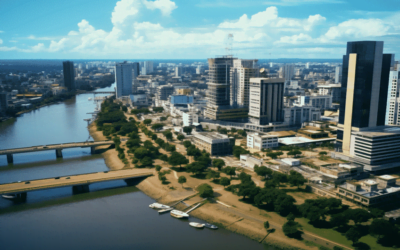Hey there, fellow drone enthusiasts and curious minds! If you’ve found your way to this article, I get it—you’re probably as intrigued as I once was about Somalia drone laws.
Whether you’re a drone pilot, a tech enthusiast, or just someone wondering how these flying machines are regulated in this part of the world, you’ve come to the right place. Trust me, I’ve been down the same rabbit hole of questions, and I’m here to share what I’ve discovered.
So, let me save you some time and tell you upfront—I’ve done the research! You see, I was on a quest to understand the ins and outs of Somalia’s drone laws.
From diving into the Somali Civil Aviation Authority’s guidelines to exploring the unique challenges faced in this region, I’ve got the lowdown on how drone operations are managed in Somalia. It’s not always straightforward, but I’ve sorted through the complexity to bring you the most up-to-date and relevant information.
If you’re eager to know how Somalia handles drone operations, from licensing to operational restrictions and the ongoing debates about drone regulations, you’re in for a treat.
This article is your one-stop resource to uncover everything about Somalia’s drone laws. So, read on, and I promise you’ll leave here with a solid understanding of how things work in the world of Somali drones. Your search intent? Consider it solved!
- Examining the Current Regulatory Environment in Somalia
- Somalia Licensing and Classification Requirements
- Somalia Operational Restrictions
- Balancing Security and Privacy Concerns in Somalia
- Debating the Need for Specific Legislation in Somalia
- Assessing the Impact of Drone Laws on Somalia’s Airspace
- Somalia Benefits and Challenges for Civilian and Military Operators
- Final Thoughts on Somalia Drone Laws
- Frequently Asked Questions About Somalia Drone Laws
Examining the Current Regulatory Environment in Somalia

Alright, folks, let’s dive right into the heart of the matter. You want to understand the current state of drone regulations in Somalia, and you’re in good company because I was equally eager to unveil this. So, let’s get into it!
Description of the current regulatory landscape for drones in Somalia
Now, when it comes to the regulatory landscape for drones in Somalia, it’s a bit like uncharted territory. Somalia is no stranger to complexities, and drone regulations here are no exception.
What makes it particularly intriguing is the absence of comprehensive, set-in-stone laws for drones. It’s a bit like the Wild West, except we’re talking about the skies.
While other countries have well-defined rules, Somalia is still finding its footing. But hang in there; it’s not all chaos.
The Somali Civil Aviation Authority (SCAA) is the key player in this scene, trying to bring some order into the drone domain.
Role of SCAA in establishing and enforcing drone regulations
Now, let’s talk about the referee of this drone game – the Somali Civil Aviation Authority (SCAA). Think of them as the air traffic controllers for drones.
SCAA is charged with setting up and implementing the rules and regulations governing drone operations in Somalia. It’s like their mission is to ensure the safe and secure use of drones while maintaining the sanctity of Somali airspace.
They’re the ones you’d turn to for all things drone-related, from getting the green light to fly to figuring out what’s allowed and what’s not.
In this evolving regulatory environment, the SCAA is both the rule-maker and the rule-keeper, striving to strike a balance between safety and the ever-expanding potential of drone technology.
Overview of SCAA’s guidelines for drone operators
So, what does the SCAA say about flying drones in Somalia? Well, they’ve set up a few guidelines to navigate the drone sphere here. One of the key points is the requirement for drone operators to obtain a license.
Yep, you heard me right; they’ve got their paperwork sorted out. If you want to fly a drone legally in Somalia, you better get that license first. And it’s not just about paying a fee; you’ll need to submit a written application with all the necessary documents.
These could include a certificate of insurance, an airworthiness certificate, and even a pilot’s license. They’re taking things pretty seriously to ensure drone operations are carried out safely.
As we explore further, you’ll find they’ve even classified drones into different categories – commercial, recreational, and military. It’s like they’re tailoring regulations to different drone uses.
Now, let’s get into the nitty-gritty of what you can and can’t do with your drone in Somalia. It’s not all free-flying; there are some restrictions in place.
They say no to drones hovering over populated areas, which is understandable. And they’ve capped the altitude at 400 feet, so you won’t be reaching for the stars here. Plus, you should keep your drone at least 5 kilometers away from airports and military bases.
Safety first, right? So, while the regulations may not be as cut-and-dry as in some other places, Somalia is navigating its own unique path in the world of drone regulations. It’s an intriguing space, and I’ve got more to uncover for you, so stick around!
Also Read: Solomon Islands Drone Laws 2024
Somalia Licensing and Classification Requirements

Now, let’s talk about something that gets any drone pilot’s heart racing – licensing and classifications.
Trust me, this is where the rubber meets the runway, or should I say the propellers meet the air? Here’s the lowdown on how to fly your drone legally in Somalia.
The licensing process for drone operators in Somalia
So, you’ve got your shiny drone ready to take off, but first, you need a license. It’s kind of like your ticket to the drone club in Somalia. To fly a drone here legally, you’ll have to go through the Somali Civil Aviation Authority’s (SCAA) licensing process.
This involves filling out an application that’s more than just a form-filling exercise. You need to provide documents, including a certificate of insurance – yep, insurance for your drone.
Safety is paramount, right? You’ll also need an airworthiness certificate for your drone and a valid pilot’s license. Once your paperwork is in order, and you’ve cleared all the safety checks, you’ll be the proud owner of a drone operator’s license. Now you’re all set to take to the Somali skies!
Classification of drones into commercial, recreational, and military categories
Alright, let’s talk about drone categories. Somalia isn’t making it a one-size-fits-all situation. They’ve got a system that categorizes drones into three main groups – commercial, recreational, and military.
Commercial drones are for those who want to make a living or get some stunning aerial shots. Recreational drones are for flying just for fun, and who doesn’t love that? The military drones, on the other hand, are reserved for, well, military use. Each category comes with its own set of guidelines, so you’ll want to know where your drone fits.
Licensing validity duration and renewal process
Now, here’s something to keep in mind – your drone operator’s license isn’t forever. It’s valid for a year, and after that, you’ll need to renew it.
The renewal process typically involves going back to the SCAA, updating your documentation, and ensuring your drone is still fit for the skies. It’s a bit like your drone’s annual check-up, but hey, it’s all for the sake of safe and responsible flying.
So, now you’ve got a clearer picture of the licensing and classifications in Somalia.
It might not be a breeze, but it’s all about keeping the skies safe and sound. Ready for more insights? Stick around; there’s more to uncover in the world of Somalia’s drone laws.
Also Read: Slovenia Drone Laws 2024
Somalia Operational Restrictions

Now, let’s get down to the nitty-gritty of drone flying. While it’s exciting to soar through the skies with your drone, there are some ground rules to follow to ensure safety and order. Somalia’s got its fair share of operational restrictions, and I’m here to break them down for you.
Operational restrictions imposed by SCAA
The Somali Civil Aviation Authority (SCAA) has set a few ground rules for drone operators. First up, they’ve capped the maximum altitude at 400 feet. It’s kind of like giving you a sky-high playground but within a manageable reach.
Also, it’s important to note that drones aren’t allowed to roam overpopulated areas. That makes sense, right? Safety is paramount, and flying drones over people can be risky. But that’s not all; SCAA is quite clear about no-go zones.
Drones are a no-show within a 5-kilometer radius of airports and military bases. It’s all about respecting airspace boundaries and ensuring no interference with other air traffic.
Emphasize the importance of complying with these restrictions
Now, here’s the deal – these restrictions are here for a reason, and it’s not just to make your drone-flying adventure less exciting. Compliance with these operational restrictions is crucial to ensuring safety, security, and order in the skies.
Think about it; the last thing anyone wants is a drone interfering with commercial flights or buzzing over sensitive military areas. By sticking to these rules, you’re not only keeping your drone safe but also ensuring that the broader airspace remains secure.
So, when you’re out there, remember that these restrictions aren’t just a set of arbitrary rules; they’re there to ensure responsible and risk-free drone operations.
Also Read: Slovakia Drone Laws 2024
Balancing Security and Privacy Concerns in Somalia

Ah, the age-old dilemma of balancing security and privacy. It’s a tricky tightrope walk in many parts of the world, and Somalia is no exception. With the rising use of drones in surveillance, the stakes are even higher. Let’s take a closer look at how this plays out in Somalia’s drone landscape.
The security landscape in Somalia and the role of drones in surveillance
Somalia’s security landscape has seen its fair share of challenges, and drones are becoming an increasingly popular tool for surveillance.
It’s not hard to see why—they can be an efficient way to monitor vast areas and gather crucial intelligence. Whether it’s tracking the movement of suspected militants or keeping an eye on potential threats, drones have found their place in the security arsenal.
Their ability to access remote and often dangerous locations is a game-changer. But, this does raise some questions about how they’re used and the extent of their surveillance capabilities.
Address privacy concerns related to unauthorized drone surveillance
Now, here’s where things get a bit tricky. With great power comes great responsibility, and drones are no exception.
There’s a looming concern that drones could be used to conduct surveillance on individuals without their knowledge or consent. It’s like the fear of the unseen eye in the sky. Privacy concerns are real, and they’re not to be taken lightly.
Unauthorized drone surveillance can infringe on personal liberties and potentially cross some ethical lines. It’s a challenge to strike a balance between maintaining security and respecting individual privacy.
Government decrees and regulations that safeguard privacy rights
Somalia might not have an all-encompassing legal framework for drones, but they’re not entirely in the dark. The government has issued a series of decrees and regulations to address these privacy concerns.
These measures include requirements for the government to obtain warrants before conducting surveillance or strikes with drones. It’s a nod to the need for due process and to ensure that drones aren’t used for indiscriminate surveillance or strikes.
Additionally, there’s a civil aviation authority in place that’s tasked with regulating the use of drones in Somalia. This authority plays a pivotal role in issuing permits and licenses, all while making sure drone operations adhere to applicable laws and regulations.
It’s a step in the right direction to ensure that the use of drones in Somalia is closely monitored and that individuals’ rights to privacy are protected, all while maintaining effective security operations. It’s a tightrope walk, but Somalia is making strides in keeping the balance.
Also Read: Singapore Drone Laws 2024
Debating the Need for Specific Legislation in Somalia

Debates are like the heartbeats of progress, and one of the hot topics in Somalia’s drone landscape is the need for specific legislation.
The arguments on both sides have their merits, and it’s a conversation worth diving into. Let’s explore what’s cooking in the realm of Somali drone laws.
Present the ongoing debate regarding the necessity of specific drone legislation
In the Somali drone community, there’s a constant buzz about whether specific legislation is needed. Some argue that we should have dedicated laws governing drones to ensure they’re used responsibly and ethically.
It makes sense – after all, these are flying machines with real-world implications, and they need structured rules for safe operation.
Arguments in favor of specific laws to ensure responsible and ethical drone use
Supporters of specific drone laws emphasize that such legislation would set the ground rules for responsible drone use.
They believe it’s essential to have a framework in place that addresses issues like safety, privacy, and the prevention of drone misuse. Think of it as creating a roadmap to guide drone operators on the right path, all while promoting ethical drone practices.
Arguments against further regulation and the assertion that international laws already cover drones
On the flip side, some argue against introducing additional drone laws. They contend that existing international laws and regulations already cover drones adequately.
According to this viewpoint, adding more rules would just be a duplication of effort. It’s all about streamlining and simplifying the regulatory environment, rather than making it more complex.
The debate rages on, and as Somalia navigates its drone laws, finding the right balance is the key to progress.
Also Read: Sierra Leone Drone Laws 2024
Assessing the Impact of Drone Laws on Somalia’s Airspace

As Somalia’s drone laws evolve, it’s natural to wonder how they impact the airspace. From safety concerns to their influence on aviation, there’s a lot to consider. Let’s take a closer look at the impact of these laws on Somalia’s skies.
The effects of drone laws on the airspace, including safety and security
Drone laws are like the air traffic controllers of the digital skies. They play a pivotal role in maintaining safety and security. By regulating the use of drones, especially in sensitive areas like airports and military bases, these laws contribute to a more secure airspace.
They also help prevent potential conflicts between drones and other aircraft. It’s like ensuring that everyone in the airspace is on the same page, following the rules for a smoother and safer flight.
Impact on drone activities, both commercial and recreational
Drone enthusiasts and businesses are also affected by these laws. Commercial drone operators, like those involved in aerial photography or surveying, need to adhere to the regulations to continue their operations legally.
Recreational drone users must be aware of restrictions, like altitude limits and no-fly zones, to ensure they’re flying within the boundaries of the law.
These laws bring structure to the drone world, and while they may impose some limitations, they aim to create a balanced and responsible environment for all drone activities.
Influence on the growth and development of the aviation industry in Somalia
The influence of drone laws extends beyond the drone community. They’ve had a significant impact on the development of Somalia’s aviation industry.
The restrictions on drone activities have made it challenging for new airlines to enter Somali airspace and for existing ones to expand their operations.
While these regulations may appear to limit growth, their primary aim is to ensure safety and security, which is vital for a thriving aviation sector. Balancing growth and safety is the key, and Somalia is taking steps to strike that equilibrium.
Also Read: Seychelles Drone Laws 2024
Somalia Benefits and Challenges for Civilian and Military Operators

Drones have become an integral part of both civilian and military operations in Somalia. As we navigate the intricacies of drone laws, let’s uncover the advantages and hurdles faced by these operators.
Civilian and military drone operators
For civilian operators, the benefits of the new drone laws are significant. The increased safety measures, including mandatory licensing and guidelines for operation, bring peace of mind.
These rules provide a clear roadmap for operating drones, reducing the risk of accidents, mid-air collisions, and other mishaps.
Additionally, the laws create a safer environment for all involved in drone activities, promote responsible use, and protect privacy.
The military, too, reaps the rewards of clearer regulations. These laws provide consistent guidance for their operations, ensuring better coordination and fewer miscommunications.
Safety remains a top priority for military personnel, and these laws help safeguard their personnel by offering guidelines for the secure utilization of UAVs.
Address potential challenges
However, it’s not all smooth sailing. Civilian operators may face a challenge in the form of licensing costs. Acquiring a drone license can be a financial burden for some, potentially deterring enthusiasts from the world of drones.
This is an issue that regulators need to consider carefully, as accessibility to drone technology can be vital for various industries and interests.
On the military side, the potential challenge lies in operational complexity. The rules and regulations may introduce an added layer of intricacy to their operations, which require precision and timeliness.
Striking the right balance between adhering to laws and achieving mission objectives is an ongoing task.
As Somalia’s drone landscape evolves, it’s crucial to find ways to address these challenges, ensuring that both civilian and military operators can benefit from the advantages of clear regulations while minimizing the hurdles they may face.
Also Read: Serbia Drone Laws 2024
Final Thoughts on Somalia Drone Laws

As we near the end of this journey through Somalia’s drone laws, let’s sum up the key takeaways and reflect on the evolving nature of drone regulations.
Somalia’s drone laws are a testament to the country’s efforts to balance innovation and safety. For hobbyists, there’s a degree of uncertainty, but it’s crucial to follow guidelines like not flying over people or near airports. Commercial drone operators must navigate a more structured path, obtaining licenses and adhering to specific classifications. Government operations have their own set of rules, ensuring safety and security.
The Somali Civil Aviation Authority (SCAA) plays a central role in regulating drone operations and ensuring the safety and security of airspace. However, there’s still work to be done to refine and expand these regulations further.
Drone regulations are not static; they’re ever-evolving. As drone technology continues to advance, so will the laws governing it. It’s vital for all operators, whether civilian or military, to stay informed and adapt to the changes. By doing so, we can ensure the responsible and secure use of drones in Somalia.
In conclusion, Somalia’s drone laws are a foundation for safe and responsible drone operations. Whether you’re flying for fun, capturing breathtaking aerial shots, or serving the nation, adhering to these guidelines is the key to a brighter, safer drone-filled future in Somalia. As we look ahead, it’s clear that the skies hold limitless possibilities, and it’s up to all of us to navigate them wisely.
Frequently Asked Questions About Somalia Drone Laws
1. Are there specific drone laws in Somalia for hobbyists and commercial operators?
In Somalia, drone laws are in a state of evolution. Hobbyist drone flights remain uncertain, and there is no specific regulation in place for them. Commercial drone operations also lack detailed rules.
While the regulatory landscape is a work in progress, the Somali Civil Aviation Authority (SCAA) is responsible for establishing and enforcing regulations.
It’s important to consult your local Civil Aviation Authority and follow international recommendations, as drone guidelines can differ from country to country.
2. What are the key operational restrictions for drone operators in Somalia?
Operational restrictions are a significant part of Somalia’s drone laws. Drones must not be flown over populated areas, and they must remain below 400 feet in altitude.
Additionally, it’s vital to avoid flying within five kilometers of airports or military bases. Staying within daylight hours and in good weather conditions is also a requirement.
The operation of drones in sensitive areas, including government or military facilities, is strictly prohibited.
3. How long is a drone license valid in Somalia, and what’s the renewal process?
Drone licenses in Somalia are valid for one year. To obtain a license, operators must submit a written application to the SCAA.
This application should include essential documents like a certificate of insurance, a valid airworthiness certificate, and a valid pilot’s license.
As the laws evolve, the specifics of the renewal process may change, so it’s important to stay up-to-date with the latest regulations.
4. Are there privacy safeguards in place to protect against unauthorized drone surveillance?
Privacy concerns are a significant aspect of Somalia’s drone laws. While there isn’t a comprehensive legal framework, the government has issued decrees and regulations that offer some protection.
These provisions require the government to obtain a warrant before conducting drone surveillance.
The regulations also ensure that drones are not used for indiscriminate surveillance or strikes. Nevertheless, more work is needed to ensure vigilant monitoring and regulation of drone usage.
5. How do Somalia’s drone laws impact the aviation industry and commercial drone activities?
Somalia’s drone laws have had a significant impact on its airspace and the aviation industry. The laws have introduced restrictions on drone activities, requiring prior authorization for operation.
This has impacted both commercial and recreational drone users. For the aviation industry, these restrictions have made it challenging for new airlines to enter the Somali airspace and for existing airlines to expand their operations.
The current drone laws need continuous evaluation and adjustment to strike the right balance between safety and industry growth.













